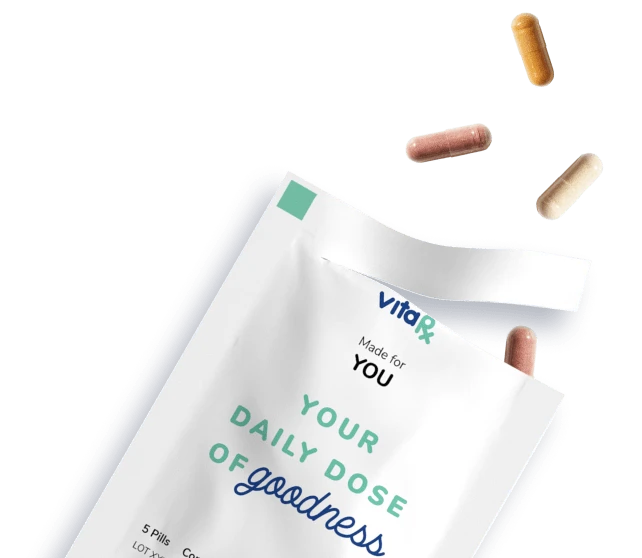Last update: January 21, 2025
7 minute read
What is Echinacea?
Learn all about Echinacea, the plant supercharging your immune system. Explore its benefits, uses, and how to maximize its potential.

By Derick Rodriguez, Associate Editor
Edited by Dr. Dimitar Marinov, MD, RDN, PhD

Have you ever wandered through the supplement aisle in your local health store and wondered about the many herbal remedies on the shelves? One standout is Echinacea, an age-old remedy known for its impressive variety of health benefits. But what exactly is it, and what can it do for you?
Key takeaways
- Echinacea is widely used for its immune-supporting properties
- Echinacea isn't found in food and is typically consumed as a supplement or tea
- Potential side effects may include mild stomach upset and allergic reactions
What is echinacea?
What is Echinacea? Well, it's a group of flowering plants in the daisy family that are native to North America. Used primarily in herbal supplements, echinacea's upper parts and roots are packed with an array of active compounds beneficial to your health.

What makes echinacea special?
Let's dive deeper into Echinacea, and what makes it so special. It's not just a pretty flower to adorn your garden, but a powerhouse of potent active compounds. And that's what makes echinacea a highly sought-after plant in the world of herbal supplements.
What are the active compounds in echinacea?
This wonder herb is loaded with a variety of active compounds like caffeic acid, alkamides, phenolic acids, rosmarinic acid, polyacetylenes, and many more. But what's even more impressive is that both the plant's upper parts and roots contain these compounds, making it a goldmine for health benefits.
VitaRx Tip
Check the labels on echinacea products to make sure they use both parts of the plant. This way, you'll be getting the full benefit of all these active compounds.
Is echinacea high in antioxidants?
Yes, Echinacea plants are loaded with antioxidants, which are vital for defending your cells against oxidative stress. Oxidative stress, as you may know, has been linked to chronic diseases, like diabetes and heart disease.
What types of antioxidants are present in echinacea?
Echinacea plants contain a variety of antioxidants, including flavonoids, cichoric acid, and rosmarinic acid. These antioxidants appear to be higher in extracts from the flowers and roots of the plants, compared to other parts, like the leaves.
Plus, echinacea plants contain compounds called alkamides, which can further enhance antioxidant activity. There's a lot of science and research behind these benefits, and that's what makes echinacea a trustworthy and reliable supplement. But, as with any supplement, I always advise doing your own research and consulting with a healthcare professional before adding it to your routine.
When it comes to your health and wellbeing, supplements like echinacea can play a significant role. They're designed to fill nutritional gaps and provide additional health benefits, like those antioxidants we've been talking about.
Echinacea is a shining example of how the power of nature can be harnessed in a supplement to provide an array of health benefits. Isn't it amazing what nature's bounty can do for your health?
How can echinacea support your immunity?
Echinacea is considered to be an immunity booster, although the evidence is mixed. Now, let's dive into why this is so.
Why is echinacea considered an immunity booster?
Echinacea is packed with compounds that may support the immune system in many ways. For example, it stimulates the activity of immune cells, increases the production of anti-inflammatory compounds, and even has antimicrobial properties.
VitaRx Tip
It's important to remember that while echinacea can support immunity, it doesn't replace a balanced diet, regular exercise, and getting enough sleep. Those are the pillars of a strong immune system.
Can echinacea help with colds and flu?
Another potential benefit of echinacea is its purported ability to help reduce the risk of the common cold but not the flu. Studies suggest that echinacea may reduce the risk. However, more research is needed to determine the optimal dosage and formulation.
Is echinacea safe for everyone?
Like any supplement, echinacea isn't for everyone. Some people should be careful, but let's break it down.
Who should be cautious when using echinacea?
Here's a quick rundown:
- People with allergies to plants in the daisy family
- People with autoimmune disorders
- People undergoing treatment that affects the immune system
If you're in any of these categories, it's best to consult a healthcare professional before taking echinacea. Now let's tie this back to the world of supplements.
Just like echinacea, there are countless other herbal supplements out there that offer an array of benefits. However, not every supplement is a good fit for everyone. It's crucial to do your research and talk to a healthcare professional to find the ones that best fit your needs.
Do’s
Do consider echinacea for short-term immune support.
Do consult a healthcare professional before starting echinacea.
Do research brands to ensure quality.
Don’ts
Don't use echinacea if you're allergic to plants in the daisy family.
Don't rely solely on echinacea for immune health.
Don't use echinacea continuously for long periods without breaks.
How does echinacea work?
The benefits of echinacea sound impressive, don't they? But you might be wondering how it actually works in your body. Let's dive into that now.
What's the mechanism behind echinacea's immunity support?
Animal studies suggest that Echinacea works by stimulating the immune system. This powerhouse plant encourages the production of more white blood cells, which are the front-line defenders in your body against foreign invaders like viruses and bacteria.
It also ramps up the production of chemicals that fight off infections. However, research in humans doesn't confirm this.
Are there different types of echinacea?
Yes, there are! Different species of echinacea have slightly different properties. Here's a handy list:
- Echinacea purpurea: This is the most common type, and it's known for its immune-boosting properties.
- Echinacea angustifolia: This species is believed to have more potent antiviral properties.
- Echinacea pallida: This type is less commonly used, but still offers some immune support.
VitaRx Tip
Regardless of the type, remember to always buy from reputable sources to ensure quality and safety.
Can echinacea interact with other medications?
Good question! While echinacea is generally safe, it can interact with certain medications.
What medications should be monitored?
If you're taking any of the following, it's best to consult your healthcare provider before taking echinacea:
- Immunosuppressants
- Certain liver medications
- Some types of chemotherapy
Remember, it's not that you can't take echinacea if you're on these medications, but it's best to do so under the guidance of a healthcare provider. Your safety is important.
Echinacea may have the potential to boost immunity, but it isn't a one-size-fits-all solution. It's essential to tailor your supplement routine to your specific needs and circumstances. Remember, knowledge is power—stay informed and make the best choices for your health!
Echinacea: A quick glance at supplement usage
In the world of nutritional supplements, there's a variety of choices, each with their own benefits. This table will give you a quick snapshot of how the usage of echinacea compares with some other common supplements.
Supplement | Percentage of Adults Using Regularly |
|---|---|
Vitamin D | 42% |
Magnesium | 37% |
Probiotics | 35% |
Fish Oil | 33% |
Vitamin C | 32% |
Echinacea | 20% |
Caption: A comparison of common supplement usage among adults. Data source: National Health and Nutrition Examination Survey (NHANES), 2023.
Advantages and disadvantages of echinacea
Echinacea has many benefits, but like any supplement, it's important to weigh the pros and cons before adding it to your health regimen.
Frequently asked questions (FAQ)
Here are some of the most frequently asked questions about Echinacea.
Final thoughts
Well, we've dug deep into the roots of echinacea – no pun intended! Remember, it's not just about jumping on the health bandwagon, it's about making informed decisions that can help pave your way to better health.
So, whether you're turning over a new leaf in your health journey or just want to branch out, remember to weigh the pros and cons of any new supplement.
Source
- Echinacea purpurea (L.) Moench: Biological and Pharmacological Properties. A Review
- The effect of Echinacea spp. on the prevention or treatment of COVID-19 and other respiratory tract infections in humans: A rapid review - ScienceDirect
- Can Echinacea be a potential candidate to target immunity, inflammation, and infection - The trinity of coronavirus disease 2019
Editor

Derick Rodriguez
Derick Rodriguez focuses on editing health and wellness-related content. With over half a decade of experience in the digital realm, Derick has developed a unique skill set that bridges the gap between complex health concepts and accessible, user-friendly communication. His approach is deeply rooted in leveraging personal experiences and insights to illuminate the nuances of health and wellness topics, making them more approachable and empowering readers with knowledge and confidence.
Fact checker

Dr. Dimitar Marinov
Dr. Marinov has years of experience in scientific research and preventive and clinical medicine. His publications in peer-reviewed journals are on nutritional status, physical activity, and musculoskeletal disorders among adolescents.
At VitaRx, we're not just passionate about our work — we take immense pride in it. Our dedicated team of writers diligently follows strict editorial standards, ensuring that every piece of content we publish is accurate, current, and highly valuable. We don't just strive for quality; we aim for excellence.
Related posts
While you're at it, here are some other relevant articles you might be interested in.

Get your personalized vitamin recommendations in less than
5 minutes.
Get your personalized vitamin recommendations in less than
5 minutes.









